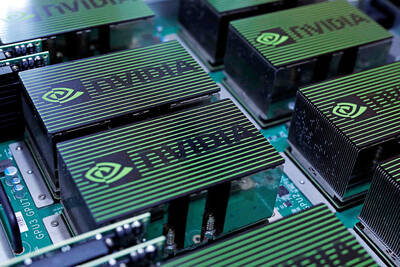German power suppliers are suing the government for 15 billion euros (US$19 billion) in damages over the decision to abandon nuclear power, the Frankfurter Allgemeine Zeitung reported yesterday.
The country’s biggest power utility E.ON, alone, wants at least 8.0 billion euros, the newspaper said, without revealing its sources.
In the wake of the nuclear disaster in Fukushima, Japan, Berlin decided to phase out nuclear power, forcing energy suppliers to shut down their profitable large-scale power plants, while it also levied a tax on the reactors’ fuel for their remaining lifespan.
Both E.ON and its next biggest rival RWE have already filed complaints with the constitutional court, arguing that the nuclear exit decision has harmed their proprietary rights as they had to shut down reactors early.
E.ON said the complaint was not about the pull-out from nuclear energy per se, which is largely supported in Germany, but about the lack of compensation for the companies affected by the energy policy U-turn.
Both companies have seen profits fall sharply owing to the shutdown of their nuclear power plants.
Meanwhile, the UN atomic watchdog said yesterday “good progress” was being made in enhancing global nuclear safety, almost a year after implementing an action plan in the wake of the Fukushima Dai-ichi disaster.
The program implemented by the International Atomic Energy Agency (IAEA) in September last year involves fresh assessments of the world’s 440 nuclear plants and emergency measures, as well as more voluntary “peer review” visits by foreign experts.
“Good progress continues to be made ... but the success of this action plan in strengthening nuclear safety is dependent upon its implementation through full cooperation and participation of member states,” Denis Flory, the IAEA’s deputy director general for nuclear safety and security, said in a keynote speech at a nuclear safety seminar held in Singapore.
Flory cautioned countries embarking on new nuclear projects to exercise “the highest level of transparency and openness in communication” to allay public concerns over safety issues.
“Nuclear energy remains a viable option for many countries as they consider their future energy mix, but we must not forget that public confidence in the safety of nuclear power was badly damaged by the Fukushima Dai-ichi accident,” he said.

Leading Taiwanese bicycle brands Giant Manufacturing Co (巨大機械) and Merida Industry Co (美利達工業) on Sunday said that they have adopted measures to mitigate the impact of the tariff policies of US President Donald Trump’s administration. The US announced at the beginning of this month that it would impose a 20 percent tariff on imported goods made in Taiwan, effective on Thursday last week. The tariff would be added to other pre-existing most-favored-nation duties and industry-specific trade remedy levy, which would bring the overall tariff on Taiwan-made bicycles to between 25.5 percent and 31 percent. However, Giant did not seem too perturbed by the

AI SERVER DEMAND: ‘Overall industry demand continues to outpace supply and we are expanding capacity to meet it,’ the company’s chief executive officer said Hon Hai Precision Industry Co (鴻海精密) yesterday reported that net profit last quarter rose 27 percent from the same quarter last year on the back of demand for cloud services and high-performance computing products. Net profit surged to NT$44.36 billion (US$1.48 billion) from NT$35.04 billion a year earlier. On a quarterly basis, net profit grew 5 percent from NT$42.1 billion. Earnings per share expanded to NT$3.19 from NT$2.53 a year earlier and NT$3.03 in the first quarter. However, a sharp appreciation of the New Taiwan dollar since early May has weighed on the company’s performance, Hon Hai chief financial officer David Huang (黃德才)

The Taiwan Automation Intelligence and Robot Show, which is to be held from Wednesday to Saturday at the Taipei Nangang Exhibition Center, would showcase the latest in artificial intelligence (AI)-driven robotics and automation technologies, the organizer said yesterday. The event would highlight applications in smart manufacturing, as well as information and communications technology, the Taiwan Automation Intelligence and Robotics Association said. More than 1,000 companies are to display innovations in semiconductors, electromechanics, industrial automation and intelligent manufacturing, it said in a news release. Visitors can explore automated guided vehicles, 3D machine vision systems and AI-powered applications at the show, along

UNPRECEDENTED DEAL: The arrangement which also includes AMD risks invalidating the national security rationale for US export controls, an expert said Nvidia Corp and Advanced Micro Devices Inc (AMD) have agreed to pay 15 percent of their revenue from Chinese artificial intelligence (AI) chip sales to the US government in a deal to secure export licenses, an unusual arrangement that might unnerve both US companies and Beijing. Nvidia plans to share 15 percent of the revenue from sales of its H20 AI accelerator in China, a person familiar with the matter said. AMD is to deliver the same share from MI308 revenue, the person added, asking for anonymity to discuss internal deliberations. The arrangement reflects US President Donald Trump’s consistent effort to engineer